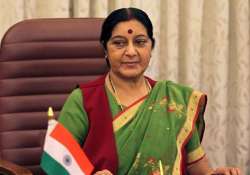Unity amidst diversity is the spirit of India: Sushma Swaraj
New Delhi: Days after US President Barack Obama's comments on religious tolerance in India, External Affairs Minister Sushma Swaraj on Wednesday said the country's spirit of unity amidst diversity, non-violence and tolerance has made it

New Delhi: Days after US President Barack Obama's comments on religious tolerance in India, External Affairs Minister Sushma Swaraj on Wednesday said the country's spirit of unity amidst diversity, non-violence and tolerance has made it one of the oldest continuous civilisation in the world.
"What is the spirit of India? I believe it is our unity amidst the immense diversity of India... It is our traditions of non-violence and tolerance. It is the age old concepts of 'Vasudhaiva Kutumbakam' (the world is a family) and 'Sarva Dharma Sambhav' (equal respect for all faiths)," she said, inaugurating an international conference on 'Indian Diaspora & Cultural Heritage: Past, Present and Future' here.
It is adherence to these ideas and ideals which has made India the oldest continuous civilisation in the world, with a history going back five thousand years, she said.
"Most of the old civilisations of the world are dead and gone, but India has continued to maintain, develop and enrich its cultural heritage," she said.
Her comments have come in the wake of Obama's statement that religious conflict has produced "acts of intolerance" in India which would have shocked Mahatma Gandhi.
"One is living in an era in which the cultural heritage of many societies is under threat, from war, from social and economic upheaval, and the forces of globalisation and cultural homogenisation."
"Cultural heritage does not end at monuments and artefacts. It also includes living traditions, the wealth of knowledge and skills that is inherited from our ancestors and passed on to our descendants."
"This is what gives us a sense of identity and continuity. It makes us who we are. The Diaspora's role in preserving cultural heritage is particularly important," the minister said.
Noting that the Heads of Mission Conference, attended by over 120 Indian Ambassadors and High Commissioners, concluded here yesterday, she said the country has millions of envoys all over the world in the form of the NRIs and persons of Indian origin who have kept the spirit of India alive in their adopted homelands.
Swaraj said India today is witnessing an "unprecedented resurgence of interest" from around the world.
"The intense exchange of high-level visits and the qualitative change in the nature of our interaction with the world since our government has taken over is proof, if proof is required, of the growing esteem with which the world sees us," she said.
The Minister stressed that this needs to be buttressed and reinforced by presenting a more sophisticated and evolved understanding of India.
"The recent adoption of the International Day of Yoga by the United Nations, with a record 177 countries co-sponsoring, shows the global appeal of India's soft power."
"This soft power is anchored in our philosophical traditions, our consistent message of peace, harmony and co-existence, the attractiveness of our customs and traditions, textiles and dresses, dance and music, and, of course of our cuisine," she said.
She said the imprint of the long journeys of our ancestors, monks, teachers and sages, carrying with them our language, ethos, beliefs, values and culture can be seen even today on the Eurasian landmass stretching up to Japan.
These journeys were arduous and strenuous but the imprint that was left behind has survived the vagaries of time, often as living traditions, Swaraj added.
"Languages and names with roots in Sanskrit, the world's largest temple complex in Angkor Vat, Buddhism and Buddhist monasteries spread across South-East Asia, the various Ramayana traditions in many countries are just some examples of how enduring has been our engagement and interface with this vast region," she said.
Giving the example of Siewdass Sadhu, a poor Indian indentured labourer in south Trinidad, she said, "He had kept a small idol in his hut. He was tried and imprisoned for illegally using his hut as a place of worship. And yet this imprisonment could not break his determination and commitment to his faith. Every day, after having done the day's hard labour in the fields, he would carry on his shoulders stones inside the sea up to where he could go and soon he had made a platform in the sea on which he established the idol.
"This was no man's land and the planter could not sue him, the government could not imprison him. He toiled for 25 years, laying brick after brick. Today it has become a place of pilgrimage, known as the Temple in the Sea," she said.
Similarly, the Indian Diaspora has retained its language, its dress, its ceremonies and traditions, Swaraj said.
"It celebrated the same festivals that it did in India, sang the same songs, played the same music. In short, it retained its essential Indianness even as it adapted to the local milieu."
"That is why the air in many countries is filled with the aromas of havans and echoes with the sweet and invigorating sound of hymns from the Vedas," she said.
The minister said that circumstances and destiny may have taken Indians out of India, but nothing could take India out of these Indians.
"You can imagine my joy when during a recent visit to Mauritius I visited the Ganga Talab overlooked by a majestic 108-feet-tall statue of Lord Shiva," she said.